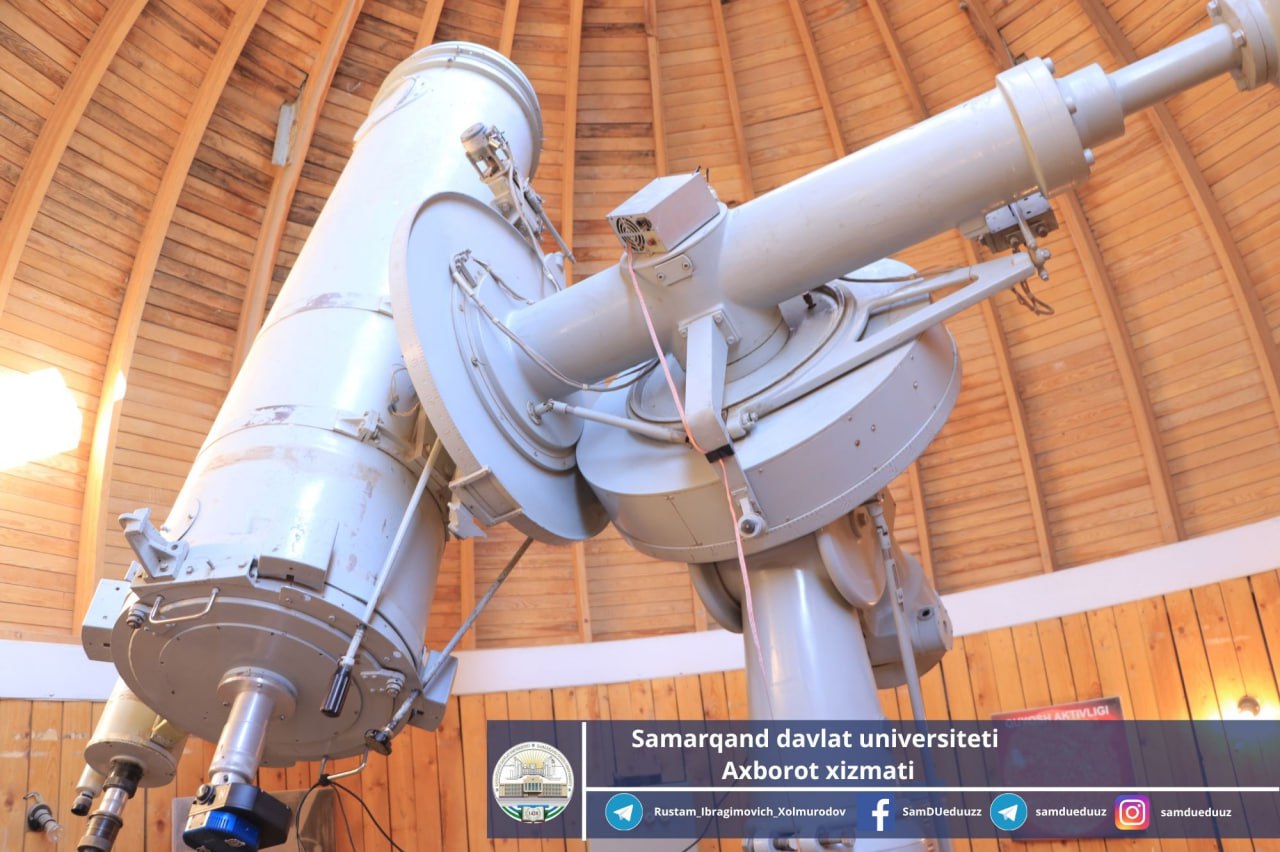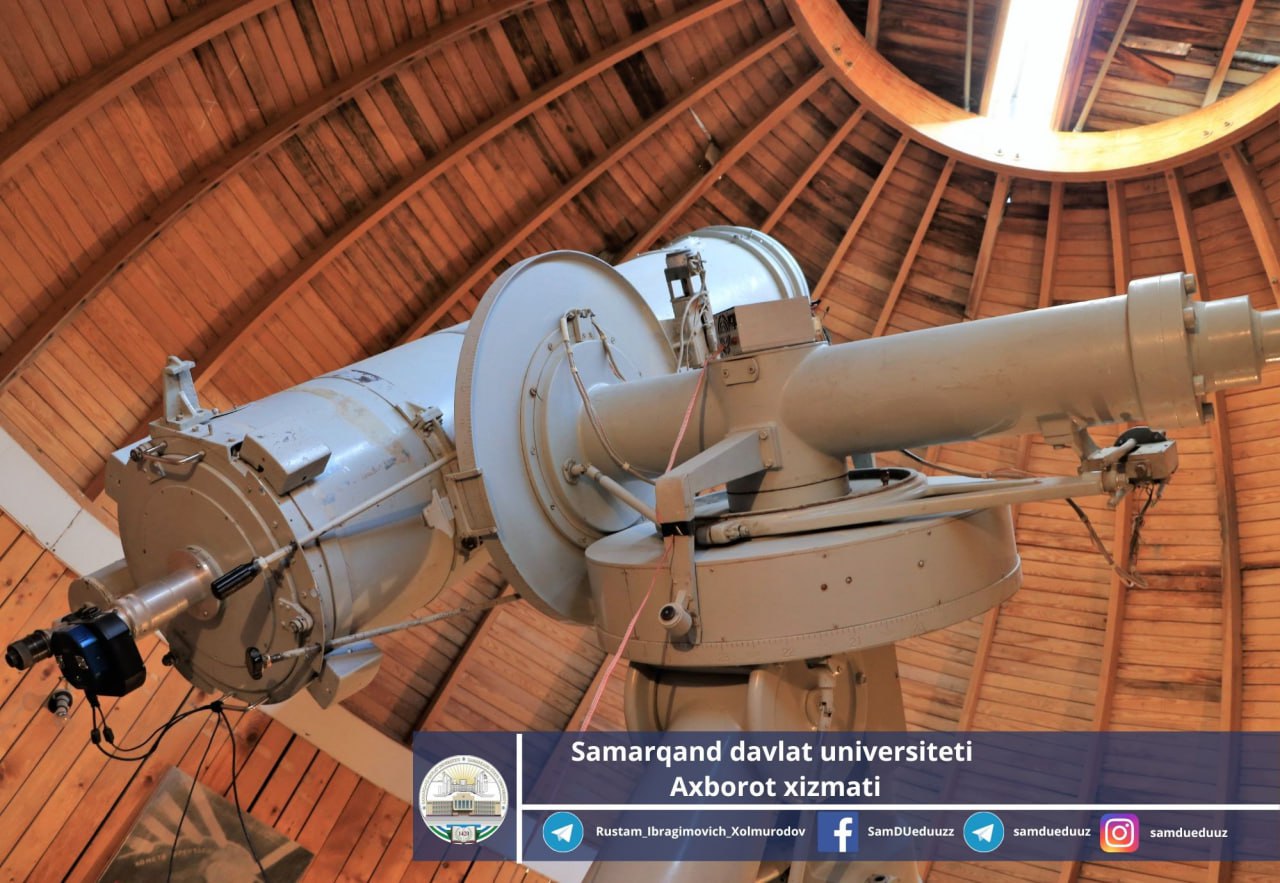NUCLEAR PHYSICS LABORATORY AND ASTRONOMY SCIENTIFIC-EDUCATIONAL CENTER OF SAMARKAND STATE UNIVERSITY
The construction of the nuclear physics laboratory of Samarkand State University (NPL SSU) began in 1983 on the initiative of Academician Tolib Musaevich Muminov. The laboratory is located on the territory of 15 hectares, and the total area of the premises exceeds 2700 sq.m. Since 2003, the laboratory has been funded in the status of a "unique object".
The main results of the NPL SSU in 2021 are:
1.Implementation of international projects, namely:
- Continuation of work on IAEA project UZB-0006 "Building Capacity in the Peaceful Use of Nuclear Science and Technologies at the National University of Uzbekistan and the Samarkand State University". The total amount of funding is 260,000 Euros. Within the project, equipment worth 95,000 Euros was received and additional equipment to the amount of 25,000 Euros is expected.
- The project “Co-Development and Cross-Pollination of Effective, Hands-On Nuclear Physics Educational Activities” within the framework of the Central Asia University Partnership Program (UniCEN) funded by the US Embassy in Uzbekistan was successfully completed. The project was carried out jointly with the Massachusetts Institute of Technology (MIT, Cambridge, Massachusetts, USA), which occupies the 1st place in the QS World university rankings. The project budget was 39136 US dollars.
2.Together with the Institute of Nuclear Physics of the Republic of Uzbekistan, the following were carried out:
- radioecological monitoring of the nuclear power plant (NPP) construction site (Jizzakh region of Uzbekistan), within the framework of an agreement between INP AS RUz and SUE “UZGASHKLITI”. Contract No. RLT-120-2021;
- radioecological surveying of the Coal Thermal Power Plant site in the Samarkand region of Uzbekistan, within the framework of the agreement between the Institute of Nuclear Physics of the Academy of Sciences of the Republic of Uzbekistan and LLC "Safety and Control". Contract No. RLT-095/2021 dated June 01, 2021;
- radioecological surveying in the construction site of Tebinbulak Mining and Processing Plant in Karakalpakstan, within the framework of the agreement between INP AS RUz and Security and Control LLC. Contract No. RLT-096/2021 dated June 01, 2021;
- radioecological surveying in the construction site of the Metallurgical Plant in the Gallyaaral district of the Jizzakh region of Uzbekistan, within the framework of an agreement between the Institute of Nuclear Physics of the Academy of Sciences of the Republic of Uzbekistan and Security and Control LLC. Contract No. RLT-097/2021;
- Work is underway on a feasibility study for a project of radiation disinfestation of fruits and vegetables and radiation sterilization of medical devices;
- Continuation of work on analysis of food samples, building materials and drinking water.
3.Laboratory exercises for training courses on nuclear electronics and measurements of low-activity environmental samples in collaboration with the Joint Institute for Nuclear Research (Dubna, Russia) have been developed.
4.In collaboration with the "Joint Institute for Energy and Nuclear Research - Sosny" of the National Academy of Sciences of Belarus, studies of radon concentrations in natural waters had been carried out.
5.In cooperation with the Ukrainian Hydrometeorological Institute (Kyiv), work has begun on the application of effective methods for measuring the radioactivity of environmental samples collected from high-risk zones.
6.More than 170 bachelor and 20 master students annually are trained in 5 new scientific and educational laboratories created with the support of IAEA grants.
7.Currently, 3 young staff members of the lab continue their graduate studies in China (Institute of Modern Physics, Lanzhou), Russia (MEPhI, Moscow) and Belarus (JIPNR-Sosny, Minsk).
8.A perpetual license was obtained from the State Committee for Industrial Safety of the Republic of Uzbekistan. (No. 158 of April 13, 2021) for the right to store and use sources of ionizing radiation.
9.Staff members of NPL successfully defended 2 (PhD) dissertations in the field of physical and mathematical sciences.
10.Conducting research at NPL 9 master students defended their theses.
11.In 2021, with the support of IAEA grant 2 staff members of the NPL completed 2-month trainings in Russia (JINR, Dubna) and Ukraine (Ukrhydromet, Kyiv). In addition, 1 senior staff member paid a scientific visit to Croatia (Institute of Ruder Boskovic, Zagreb). From January to May 2022, 1 NPL staff member will undergo a 4-month fellowship at the Massachusetts Institute of Technology (MIT, Cambridge, Massachusetts, USA).
12.6 articles were published in scientific journals, including 3 articles in journals indexed in the SCOPUS database, 4 articles were sent for publication. 9 articles and abstracts were published in the materials of international and 5 in the materials of republican conferences.
In 2020, at the expense of funds allocated by the government in the amount of 6.1 billion soums, the buildings and infrastructure of the NPL SSU were completely renovated.
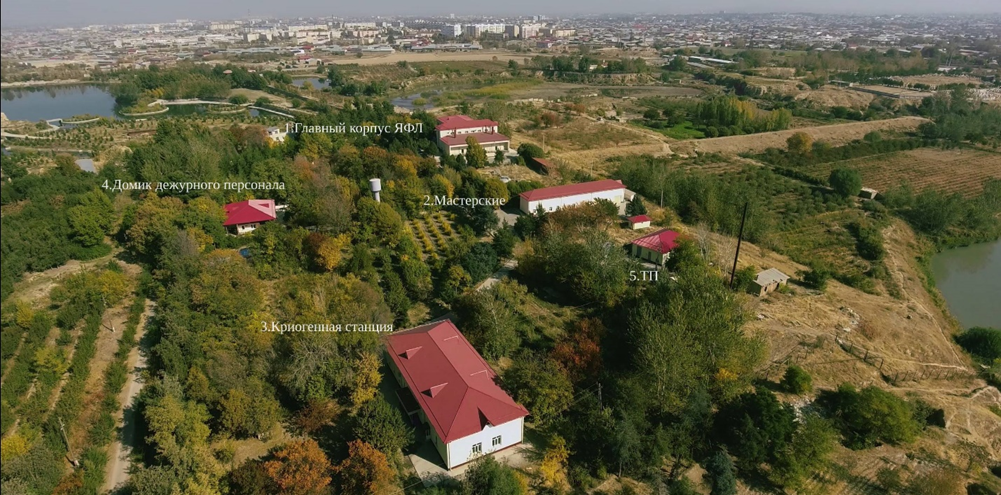
Fig. 1 – General view of NPL SSU
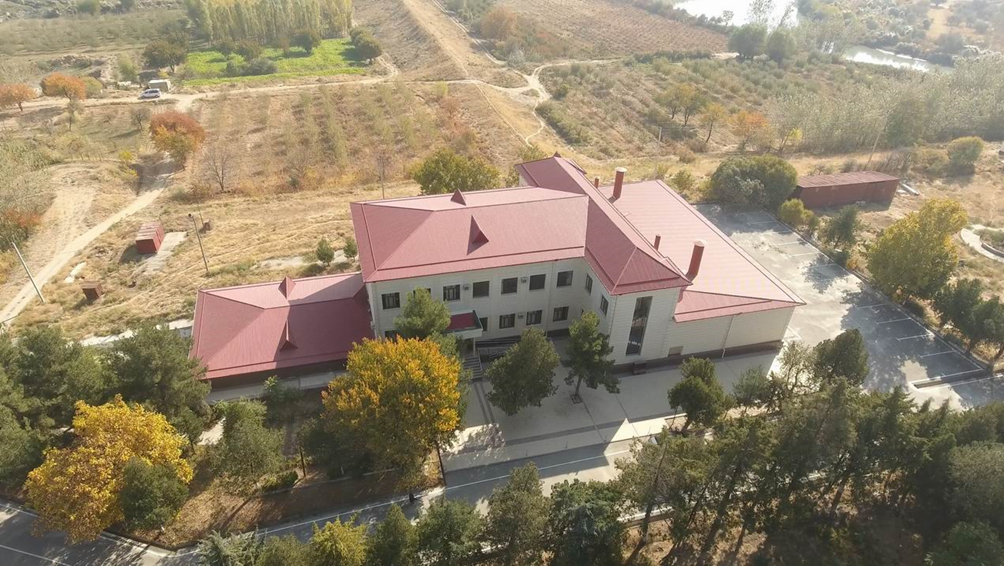
Fig.2 Main building of NPL SSU.
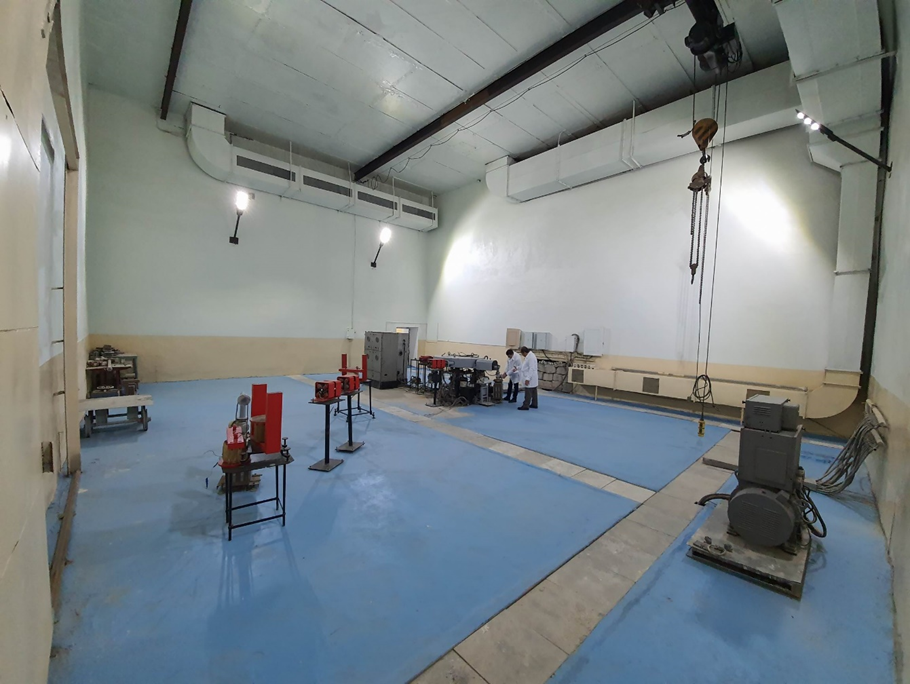
Fig.3 Underground accelerator room
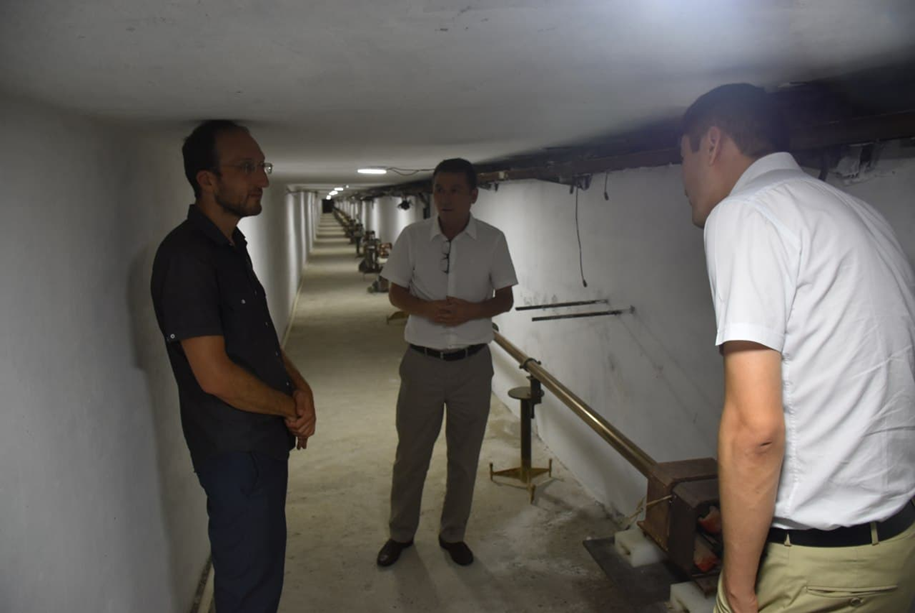
Fig.4 Underground 300 m experimental channel
(visit of professor Mike Short from MIT. August 2021)
In connection with the construction of the first nuclear power plant in Uzbekistan, the most important activity of the NPL SSU is to improve the process of training of highly qualified personnel in the field of nuclear physics. Decrees of the President of the Republic of Uzbekistan PP-4165 dated 07.02.2019 “On approval of the Concept for the development of nuclear energy in the Republic of Uzbekistan for the period 2019-2029”, PP-4492 dated 10.16.2019 “On approval of the Strategy for the development of personnel potential of the nuclear energy programs of the Republic of Uzbekistan” and the Law of the Republic of Uzbekistan ZRU-565 dated 09.09.2019 “On the use of atomic energy for peaceful purposes” define the tasks for training personnel in the field of nuclear energy and nuclear technologies. According to abovementioned documents, the National and Samarkand Universities are tasked to improve the standards of education in the field of nuclear physics in accordance with the practices of the world's best universities.
In pursuance of this order by attracting foreign grants for a total of 1 million US dollars, NPL’s equipment base has been significantly improved, and 5 scientific and educational laboratories have been created:
1. Laboratory of atomic physics.
2. Laboratory of nuclear physics.
3. Laboratory of nuclear reactor physics.
4. Laboratory of nuclear electronics.
5. Laboratory of dosimetry and radioecology.
More than 170 bachelor and 20 master students are trained in these laboratories every year. Undergraduates, doctoral students and independent scholars conduct their scientific research here.
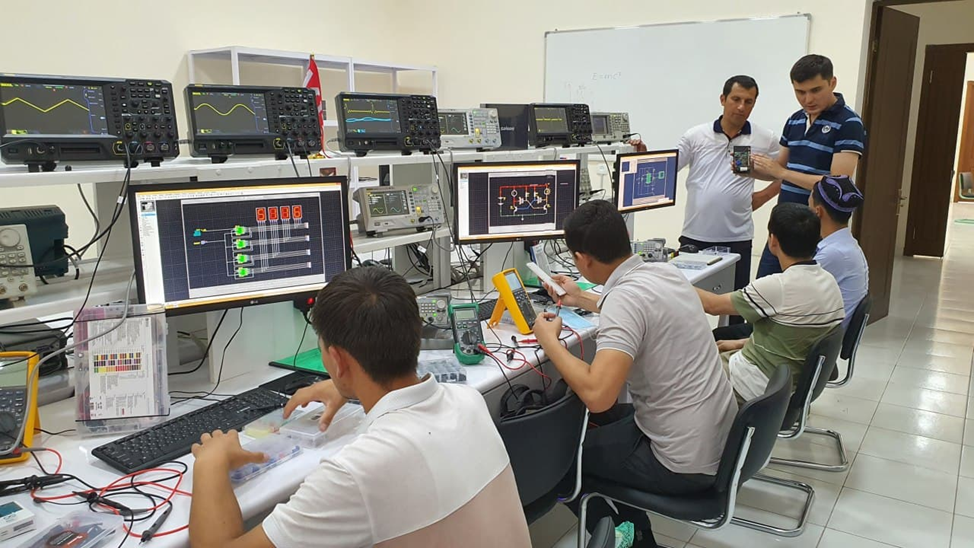
Fig. 5 Nuclear electronics laboratory
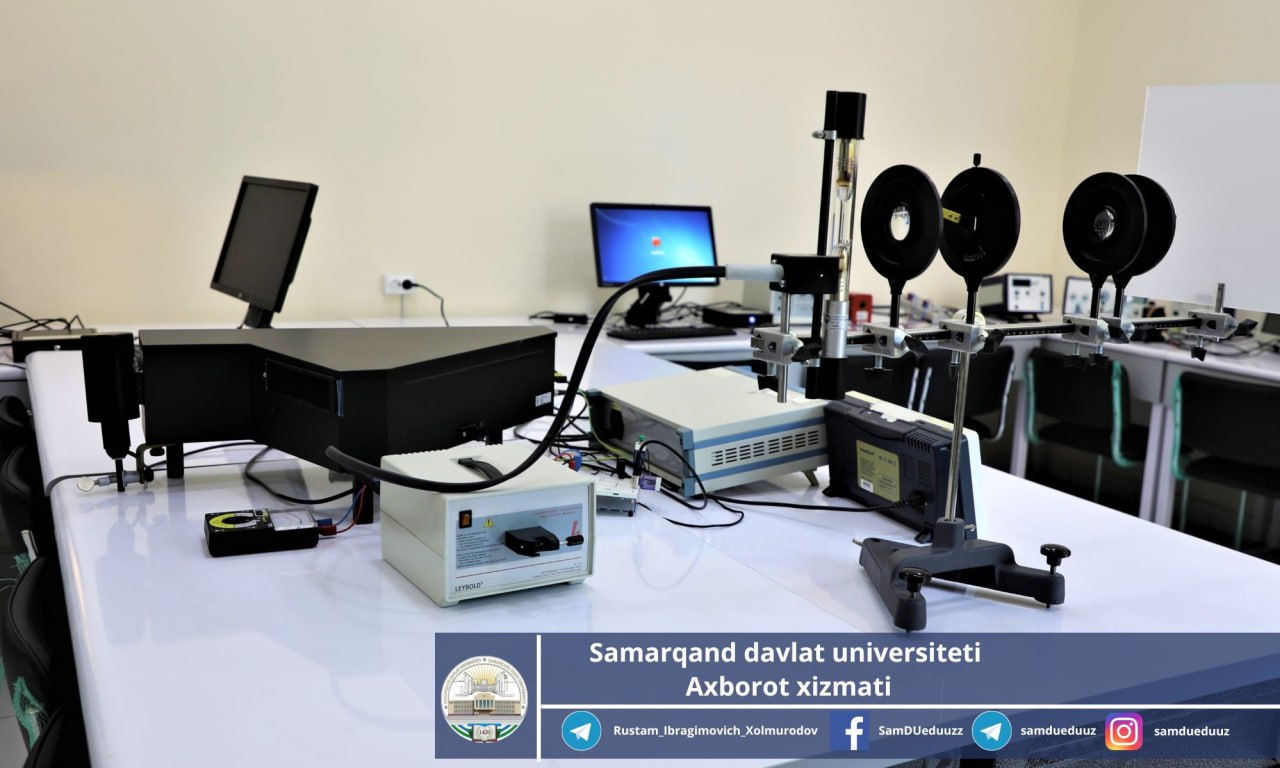
.jpg)
Fig. 6 Atomic physics laboratory
In recent years, laboratory staff have improved their qualifications in foreign research centers: Trieste (Italy), the Universities of Surrey and Liverpool (Great Britain), Jyvaskula (JYFL, Finland), the University of Zagreb (Croatia), the IAEA laboratory in Siebersdorf (Austria), Moscow State University named after Lomonosov, JINR (Dubna, Russia), Dounreay (Scotland). In 2021, with the support of IAEA grant, 3 laboratory specialists undertook 2-month fellowships in Ukraine (Ukrhydromet, Kyiv) and Russia (JINR, Dubna) and 1 scientific visit in Croatia (Ruder Boskovic Institute, Zagreb).
Until December 2021, Academician Muminov Tolib Musaevich was the scientific supervisor of the NPL SSU. There 6 PhD’s in the lab. In 2021, 3 doctoral students, 2 independent scholars, 19 master and 15 bachelor students of the Department of Nuclear Physics of SSU conducted research at NPL.
At present, the staff of the NPL SSU is faced with the task of replacing physically and morally obsolete basic accelerators that have been in operation for 35 years. The volume of required investments exceeds 3 million US dollars. The rector of the university prof. R.I. Khalmuradov, President of the Academy of Sciences of the Republic of Uzbekistan. B.S. Yuldashev and the khokimiyat of Samarkand region are paying serious attention to this issue.
